Related Products
For Parents
Related Teacher Tools Takeout Items
5 Ways to Support Deaf or Hard of Hearing Children Over the Summer
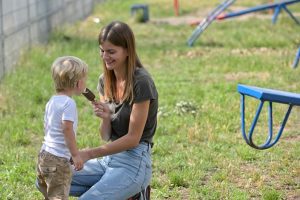 A child who is deaf or hard of hearing (DHH) often has challenges understanding in situations that are not their typical, day-to-day communication. A simple trip to the beach can bring on a hint of anxiety or a large family gathering can be a breeding ground for communication breakdown. By thinking through scenarios ahead of time, you can ensure an enjoyable summer vacation for your child who is DHH by taking a few extra steps! This article shares different ways you can help children with hearing loss over the summer.
A child who is deaf or hard of hearing (DHH) often has challenges understanding in situations that are not their typical, day-to-day communication. A simple trip to the beach can bring on a hint of anxiety or a large family gathering can be a breeding ground for communication breakdown. By thinking through scenarios ahead of time, you can ensure an enjoyable summer vacation for your child who is DHH by taking a few extra steps! This article shares different ways you can help children with hearing loss over the summer.
1. Communication Can Be Tough!
A child who is DHH may have to work harder than his/her hearing peers while at school, so during summer vacation, it’s ideal to create an environment where auditory access isn’t compromised. However, getting together at a large family gathering or at the pool or beach can quickly lead to a meltdown if too noisy or overstimulating and not accessible. When seeing large groups of family and friends, it’s always a good idea to remind them of some simple rules that benefit your child, such as tapping the child on the shoulder and saying their name to get their attention before talking to them. Encourage the child to speak up from an early age and to never be embarrassed to say when they didn’t understand something. It can be a challenge for some parents and caregivers to point out the hearing difference of their child, but the more you can show your child that you are accepting of them and encourage them to speak up, the stronger and more confident they will be advocating as they grow.
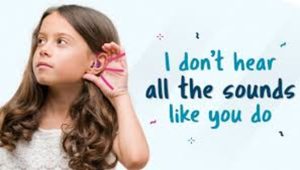 If your child uses a Remote Microphone System (RMS) at school, you may want to consider purchasing one for personal use to bring along to restaurants, the park, and bike rides. If your child will be playing with friends and they are responsible (as responsible as a small child can be), encourage them to give the RMS to their friends to wear. This small gesture can encourage self-advocacy, especially as they enter secondary school and will likely be responsible for passing the RMS to each of their teachers. It will also show their friends that your child does hear differently and sometimes needs different things to help them hear, and that’s okay! Ask your child’s audiologist about remote microphone hearing technology.
If your child uses a Remote Microphone System (RMS) at school, you may want to consider purchasing one for personal use to bring along to restaurants, the park, and bike rides. If your child will be playing with friends and they are responsible (as responsible as a small child can be), encourage them to give the RMS to their friends to wear. This small gesture can encourage self-advocacy, especially as they enter secondary school and will likely be responsible for passing the RMS to each of their teachers. It will also show their friends that your child does hear differently and sometimes needs different things to help them hear, and that’s okay! Ask your child’s audiologist about remote microphone hearing technology.
2. Pals with Hearing Loss are Priceless!
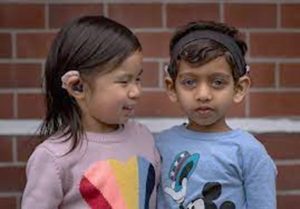 If your child is in a school mainstream setting, use the summer to tailor their social circles to ones where communication is effective for them – which is chatting with other deaf and hard of hearing peers! Take advantage of all the summer has to offer and build some trips or family outings around events in your area where deaf/hard of hearing events are being offered. Or connect with families to allow the children to Zoom, text, or otherwise chat through media frequently throughout the summer.
If your child is in a school mainstream setting, use the summer to tailor their social circles to ones where communication is effective for them – which is chatting with other deaf and hard of hearing peers! Take advantage of all the summer has to offer and build some trips or family outings around events in your area where deaf/hard of hearing events are being offered. Or connect with families to allow the children to Zoom, text, or otherwise chat through media frequently throughout the summer.
It’s important that our children have the opportunity to grow and understand their self-concept. There are many national organizations whose focus is connecting families of deaf and hard of hearing children with each other. We suggest reaching out to your local Hands & Voices chapter or AG Bell chapter to see what is being offered in your state. These organizations are known to offer a variety of events throughout the year including gatherings, picnics, fundraisers, etc. where your child will be able to meet others just like them. If connecting virtually fits better with your family, look no farther than the American Society for Deaf Children. ASDC offers Friends Like Me, a virtual platform hosted weekly by a DHH Adult Mentor. Choose from different age groups and modes of communication (oral, ASL or both).
Your child may also enjoy attending a summer camp that is geared towards deaf and hard of hearing children. Many adults who are DHH say their camp experiences as a child were some of the most memorable pieces of their childhood and a time when they could make connections easily with other children who were like them. There are many sleep-away and day camps that offer programs geared towards all the different age-groups and communication modalities.
3. Reading Rocks!
As a parent, you want what is best for your child. You want them to succeed in school, ensure they have all the tools needed and not fall victim to what’s referred to as the ‘summer slide’. Reading is perhaps the easiest, most simple thing that can be done anywhere and anytime to help develop vocabulary, literacy and attention skills! Preferably, read books that have main characters who are deaf and hard of hearing so the child can better relate by seeing characters like themselves. See our children’s booklist!
 Children who are deaf and hard of hearing benefit from having rich conversations, filled with new vocabulary and the chance the understand new words and concepts. Check with your local library to see what summer programs they offer. Oftentimes, summer reading programs for children come with prizes once they reach their reading goal which could be a great incentive! Let book selections be steered by your child’s interest. Consider reading books that have slightly advanced vocabulary that your child hasn’t been exposed to yet, such as the word ‘yacht’ instead of ‘boat’. Cherish those teachable moments as to what a yacht is and that different objects, although the same, can have different words to describe them.
Children who are deaf and hard of hearing benefit from having rich conversations, filled with new vocabulary and the chance the understand new words and concepts. Check with your local library to see what summer programs they offer. Oftentimes, summer reading programs for children come with prizes once they reach their reading goal which could be a great incentive! Let book selections be steered by your child’s interest. Consider reading books that have slightly advanced vocabulary that your child hasn’t been exposed to yet, such as the word ‘yacht’ instead of ‘boat’. Cherish those teachable moments as to what a yacht is and that different objects, although the same, can have different words to describe them.
We also suggest enabling the captions on everything your child watches whether it’s a movie, TV show or YouTube video. Even if your child isn’t a proficient reader, captions will encourage your child to begin pairing the written word with the spoken word. It will also ensure, if they are a reader, that they won’t be missing out on their favorite movie or show. If your child will be sleeping at a friend’s house, ask the parents if they could enable captions on the screen. If you are going to a movie theater, plan accordingly and make sure the movie either offers open captions (on the screen), closed captioning glasses or a handheld device for your child to use. Arrive at the theater early to give the staff time to program the glasses or hand-held device to your selected movie. It can take additional time to plan but your child will be happy when they can laugh along and understand what’s being said!
4. Water Sports and Wet Tech – Oh No!
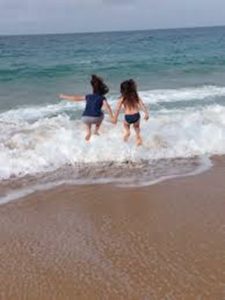 The idea of spending the day at the beach or pool with a child who is deaf or hard of hearing can take some additional planning to be a sure a good time is had by all. If your child uses amplification that is not waterproof, you’ll want to be sure they have a waterproof case and a safe place to store their devices when not in the water. If your child utilizes cochlear implants and they have a waterproof case, but sure to pack that in your beach bag along with any retention tools. Look into Ear Gear, which is a water-resistant sleeve that fits over the hearing device to guard against expensive repairs due to sweaty heads (or running through the sprinkler – oops – moments). Regardless of amplification, be sure to bring extra batteries along or recharge your batteries the night before. If your child is on a swim team and is having trouble following along, talk to the swim coach before practice. Let them know your child cannot hear once their devices are off and they are in the water. If you don’t use a visual support (such as American Sign Language or Cued Speech) perhaps your child and coach can develop signs/gestures so they can follow along and ‘see’ when the whistle is blown instead of relying on their hearing, for example.
The idea of spending the day at the beach or pool with a child who is deaf or hard of hearing can take some additional planning to be a sure a good time is had by all. If your child uses amplification that is not waterproof, you’ll want to be sure they have a waterproof case and a safe place to store their devices when not in the water. If your child utilizes cochlear implants and they have a waterproof case, but sure to pack that in your beach bag along with any retention tools. Look into Ear Gear, which is a water-resistant sleeve that fits over the hearing device to guard against expensive repairs due to sweaty heads (or running through the sprinkler – oops – moments). Regardless of amplification, be sure to bring extra batteries along or recharge your batteries the night before. If your child is on a swim team and is having trouble following along, talk to the swim coach before practice. Let them know your child cannot hear once their devices are off and they are in the water. If you don’t use a visual support (such as American Sign Language or Cued Speech) perhaps your child and coach can develop signs/gestures so they can follow along and ‘see’ when the whistle is blown instead of relying on their hearing, for example.
The mentality of ‘the more the merrier’ isn’t always better when it comes to our children and social settings, especially around the water or during other fun summer activities, as large groups can be difficult to navigate. Keeping your fun time limited to one other friend for your child can allow them to be more engaged in the conversation and able to follow along more easily. Of course, not all children are the same, however, if your child also has trouble navigating group settings, pay attention to this when scheduling playdates at the pool or beach. If you are going to be with a large group around the water, make sure you carve out some time for your child to interact in a small group and have some downtime when they can use their amplification devices.
5. Check, Check, Check!
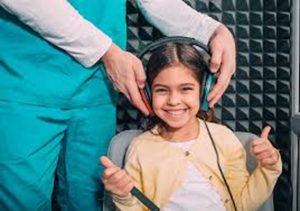 When summer is in full swing, the last thing you may want to do is schedule a doctor appointment. However, it’s important to consider scheduling an appointment with your child’s audiologist before the start of the school year. You want to give your child all the tools they need to succeed once back in the classroom, so making sure their hearing hasn’t changed, ear molds are a proper fit, there aren’t cracks in the tubing, and cochlear implant map and hearing aid programs have been adjusted will give your child the confidence they need to enter the classroom. Here is a handout with great information and things to remember about wearing hearing devices.
When summer is in full swing, the last thing you may want to do is schedule a doctor appointment. However, it’s important to consider scheduling an appointment with your child’s audiologist before the start of the school year. You want to give your child all the tools they need to succeed once back in the classroom, so making sure their hearing hasn’t changed, ear molds are a proper fit, there aren’t cracks in the tubing, and cochlear implant map and hearing aid programs have been adjusted will give your child the confidence they need to enter the classroom. Here is a handout with great information and things to remember about wearing hearing devices.
Enjoy the lazy days of summer with your child and cherish life’s teachable moments while on summer vacation!
Author: Teri Urban parent@success4kidswhl.com
